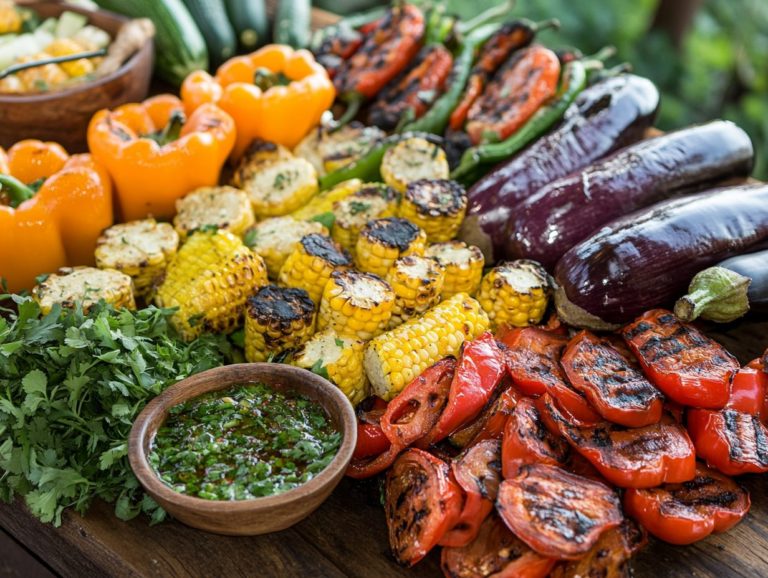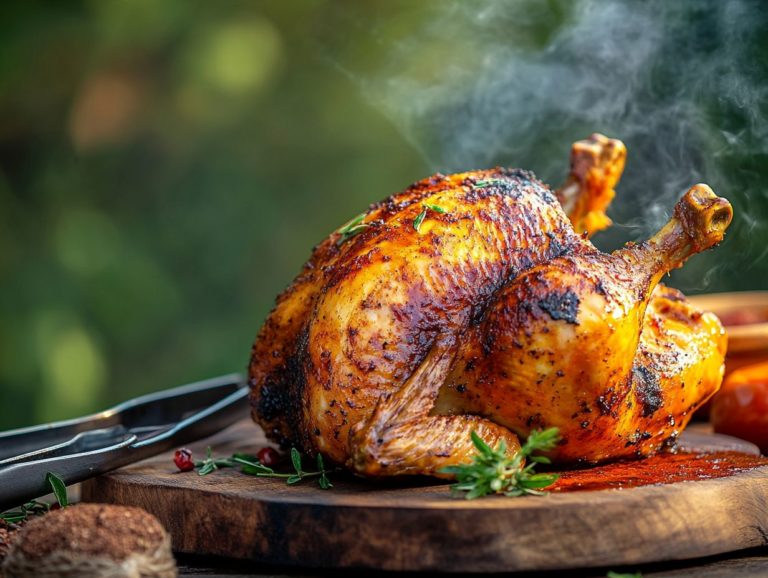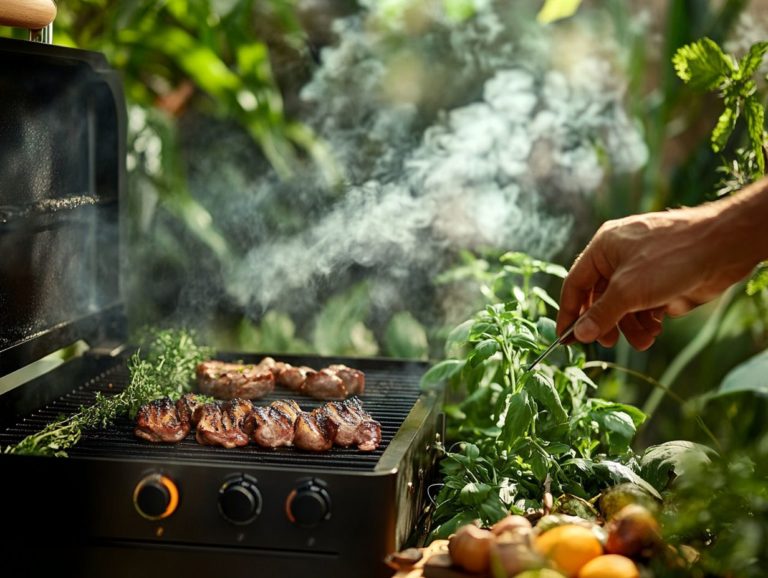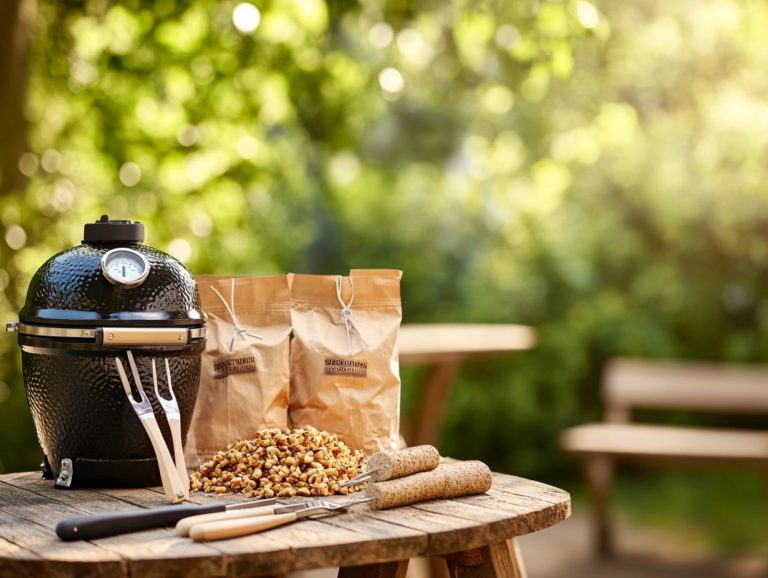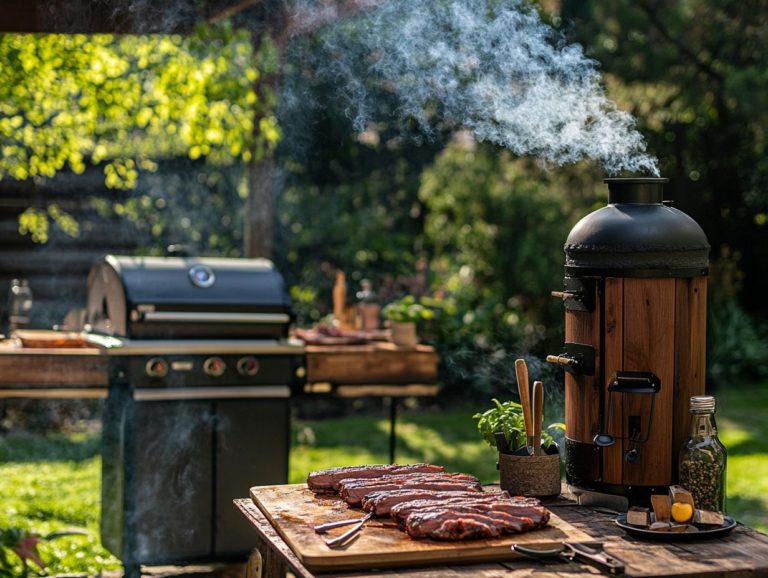The Ultimate Guide to Smoker Thermometers
Whether you’re a seasoned pitmaster or a weekend grilling aficionado, a smoker thermometer is your secret weapon for perfectly cooked and safe meats!
This guide encompasses everything you need to know about these devices, from their purpose to the various types available, such as analog and digital thermometers. We ll also cover key factors to consider, including features like wireless connectivity and measurement accuracy when making your selection.
You ll discover how to use a smoker thermometer effectively, the benefits it brings to your cooking experience, and tips for troubleshooting common issues with temperature controllers and gadgets.
By the end, you ll be ready to elevate your smoking game!
Contents
- Key Takeaways:
- What is a Smoker Thermometer?
- Types of Smoker Thermometers
- Factors to Consider When Choosing a Smoker Thermometer
- How to Use a Smoker Thermometer
- Benefits of Using a Smoker Thermometer
- Troubleshooting Common Issues with Smoker Thermometers
- Frequently Asked Questions
- What are smoker thermometers and why do I need one?
- What types of smoker thermometers are available?
- How do I calibrate my smoker thermometer?
- What is the ideal temperature range for smoking different types of meat?
- Can I use a regular meat thermometer for smoking?
- How do I clean and maintain my smoker thermometer?
Key Takeaways:
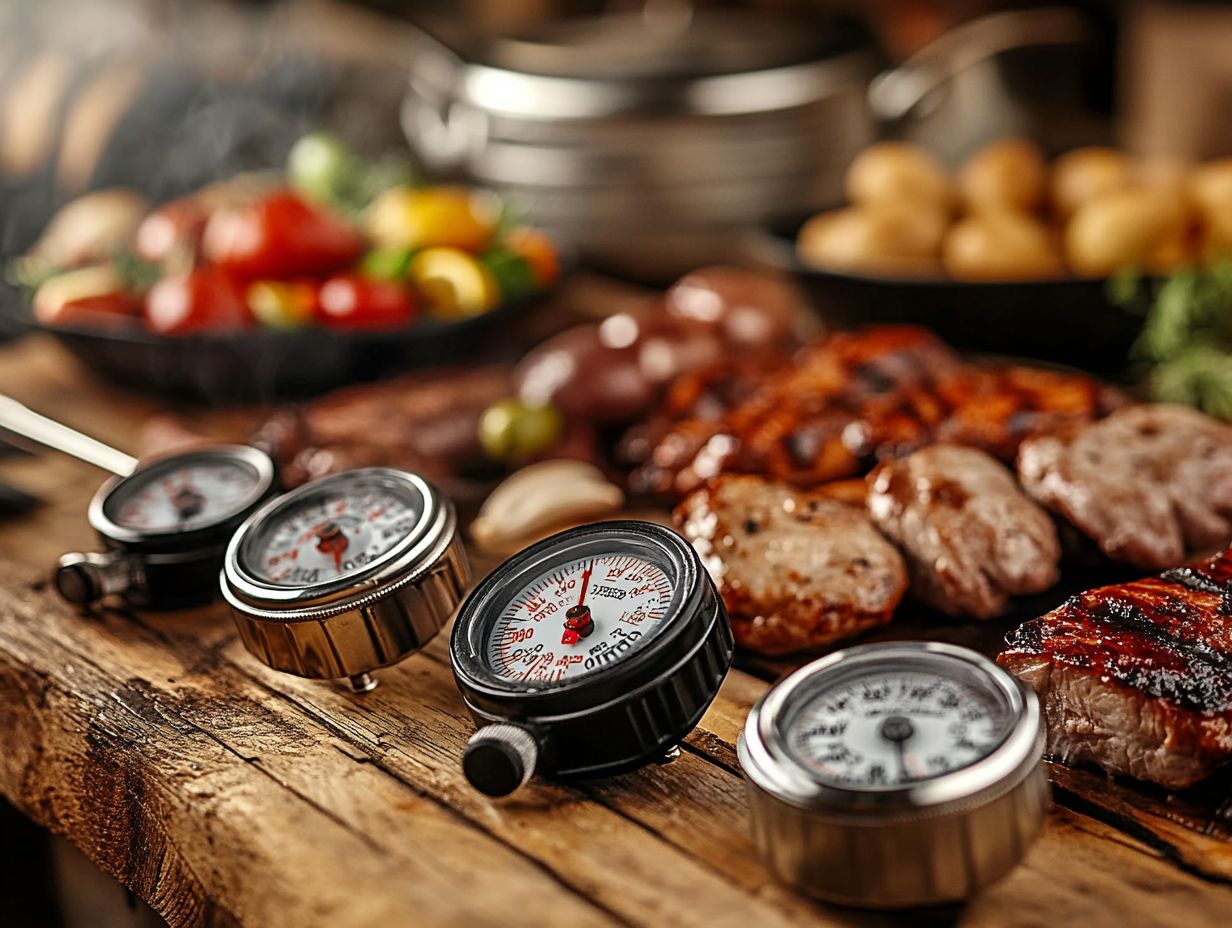
- A smoker thermometer is your secret weapon for perfectly cooked and safe meats.
- When choosing a smoker thermometer, look for accuracy, temperature range, durability, and ease of use.
- Proper use and maintenance of a smoker thermometer can enhance cooking results and ensure food safety.
What is a Smoker Thermometer?
A smoker thermometer is an essential tool for any BBQ enthusiast, allowing you to monitor the internal temperature of your meats with ease, ensuring that every cook is both safe and mouthwateringly delicious.
Unlike traditional thermometers, today s modern smoker thermometers come equipped with digital, Bluetooth, and Wi-Fi wireless features, enabling you to obtain real-time temperature readings without the hassle of constant supervision.
This innovation is especially advantageous for cuts like brisket and chicken, where precision is key to achieving that perfect level of doneness and elevating the flavors of your smoked creations, thanks to accurate temperature probes.
Definition and Purpose
The primary role of a smoker thermometer is to help you keep a close eye on the internal temperatures of various meats throughout the cooking process. This monitoring is crucial for finding the right balance between smoky flavor and tenderness, while also ensuring that your meats reach safe temperatures to eliminate any harmful bacteria. For example, it s essential to cook poultry to an internal temperature of 165 F for food safety, but brisket and pork have their own target temperatures to achieve optimal tenderness.
Temperature variations can greatly affect the texture and juiciness of your final dish, enhancing your overall BBQ experience. By using a reliable thermometer, you not only guarantee quality and flavor but also enjoy peace of mind, allowing you to concentrate on delivering mouthwatering results.
Types of Smoker Thermometers
Smoker thermometers are available in a range of types, each designed to meet specific needs and complement various cooking styles for BBQ aficionados. You ll find primary categories such as analog and digital thermometers, each presenting its own set of advantages and functionalities.
Remote and instant-read thermometers provide added convenience, enabling you to monitor temperatures accurately without interrupting the cooking process.
Analog vs. Digital Thermometers
Analog thermometers rely on traditional dials, while digital thermometers offer you accurate and instantaneous temperature readings, making them a favorite among BBQ enthusiasts.
Choosing between them often boils down to your specific cooking needs and personal preferences. Analog thermometers exude a classic charm and simplicity, perfect for those who appreciate a hands-on approach to grilling. They typically require little to no batteries and can withstand high heat, making them durable companions for your outdoor cooking adventures.
On the flip side, digital thermometers provide a level of precision that s hard to overlook. With backlit displays and quick response times, they can boost your confidence in achieving the right cooking temperatures. In terms of smoking, where maintaining consistent heat is key, digital options generally shine. However, analog models can still deliver satisfactory results for those who relish the rustic touch of traditional cooking methods.
Remote vs. Instant Read Thermometers
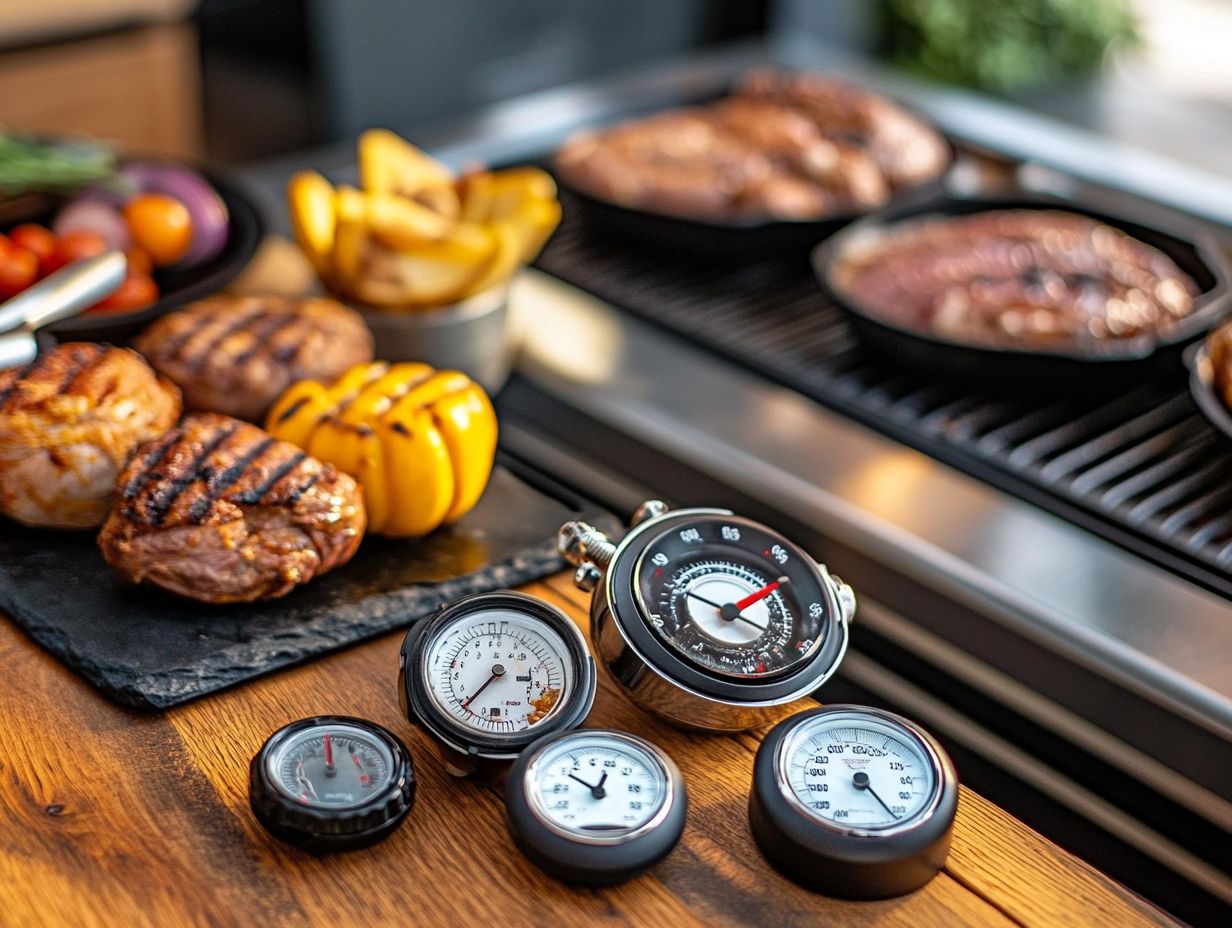
Remote thermometers provide the luxury of checking temperatures from a distance using Bluetooth or Wi-Fi technology. Instant-read thermometers deliver quick temperature checks, making them essential tools for any BBQ lover!
These devices are vital for cooking meats perfectly! They are especially important when smoking and grilling techniques demand precise temperature control. The remote thermometer allows you to track your cooking progress from afar. This freedom lets you enjoy the festivities or dive into other activities without the need for constant supervision.
Instant-read thermometers are great for quick temperature checks. They ensure that every steak or chicken breast meets the highest food safety standards in just seconds. With their distinct functionalities, both types of thermometers cater to specific needs, significantly enhancing your overall grilling experience.
Factors to Consider When Choosing a Smoker Thermometer
When selecting a smoker thermometer, consider key factors. These include accuracy, temperature range, durability, and ease of use.
Each of these features plays a crucial role in enhancing the quality of your cooking and elevating your overall satisfaction.
Accuracy and Temperature Range
Accuracy in temperature readings is essential for smoker thermometers. It directly influences both food safety and the overall deliciousness of your dishes, especially when grilling meat.
When you re navigating the world of BBQ, ensuring that your meats are cooked within the ideal temperature range is crucial. It s not just about achieving maximum flavor and tenderness; it s also about preventing food safety risks. For example, aim for an internal temperature of 165 F for poultry, while medium-rare beef should ideally reach around 135 F. Understanding these specifics allows you, as a grill master, to maintain the integrity of your dishes while prioritizing health.
Using a calibrated thermometer ensures that every bite is both safe and succulent. This transforms your grilling experience into a delicious meal for everyone involved, enhancing the quality of your BBQ.
Durability and Ease of Use
When selecting a smoker thermometer, durability and ease of use are paramount, especially if you re a frequent BBQ enthusiast.
Investing in a thermometer that can handle high temperatures and tough outdoor conditions not only ensures accurate readings but also saves you money over time. A reliable device will accompany you through many grilling seasons. Plus, features like easy-to-read displays and intuitive controls can elevate your cooking experience.
By choosing a model that balances durability with user-friendly design, you can enhance every barbecue, ensuring your meals turn out amazing while you spend more time savoring the flavors instead of grappling with complicated gadgets.
How to Use a Smoker Thermometer
Utilizing a smoker thermometer elevates your BBQ experience. It enables you to monitor temperatures with precision and achieve optimal cooking results.
With this tool in hand, you can perfectly cook every piece of meat, making your gatherings not just meals, but memorable culinary events.
Step-by-Step Guide
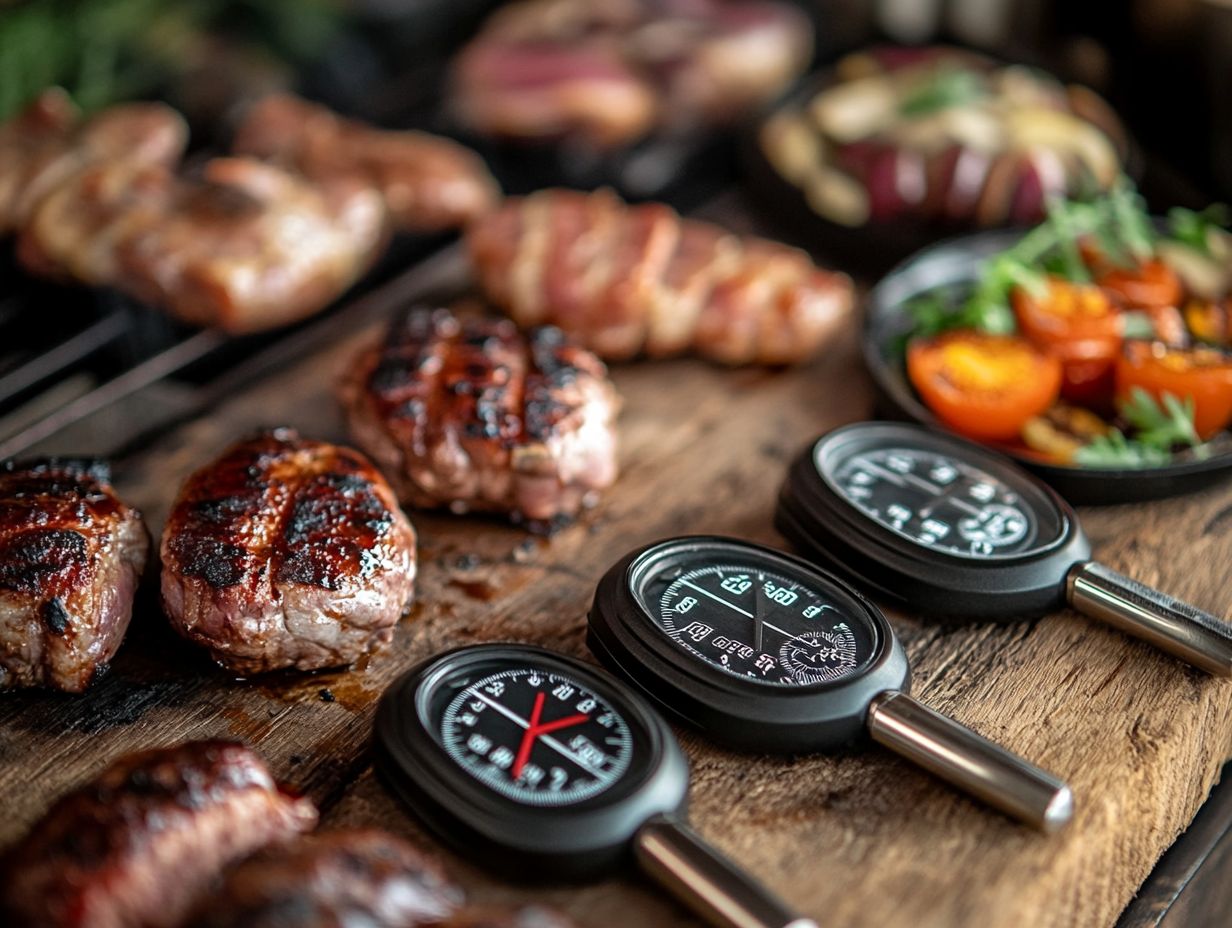
To use a smoker thermometer effectively, follow this detailed guide for accurate temperature readings and enhanced cooking results. This way, your smoking game will be top-notch!
Start with a proper setup: preheat the smoker and position the thermometer correctly. This keeps your temperatures steady, so your food turns out amazing every time!
Get acquainted with the various temperature zones that impact flavor and texture. This ensures that your meat or vegetables reach the perfect doneness you desire.
As you cook, regularly check the readings and make adjustments as needed to avoid overcooking or undercooking. This proactive approach elevates flavor and leads to a perfectly smoked meal that is sure to impress your friends and family.
Benefits of Using a Smoker Thermometer
Utilizing a smoker thermometer offers numerous advantages, including superior cooking results and heightened food safety. It’s a must-have for BBQ lovers of any skill level.
Improved Cooking Results
A significant advantage of using a smoker thermometer is that it enhances both the flavors and juiciness of your meats. Precise temperature control allows you to create the perfect environment for smoking or barbecuing.
This ensures every cut of meat cooks evenly and reaches the ideal doneness without drying out. By closely monitoring the temperature inside the meat, you can avoid the common traps of overcooking or undercooking, which can drastically affect the quality of your dish.
An accurate thermometer also helps you infuse rich, smoky flavors more effectively, as different meats and woods require specific temperature ranges for the best possible results.
Food Safety
Food safety is crucial in BBQ. Using a smoker thermometer ensures you obtain precise internal temperature readings, keeping your meats cooked safely.
Keep an eye on the internal temperature to avoid foodborne illnesses. Pathogens like Salmonella and E. coli thrive in improperly cooked meats. A reliable thermometer allows you to confidently verify whether your meals have reached the recommended internal temperatures, which vary depending on the meat type. This enhances flavor and texture and brings peace of mind to everyone at your gathering.
The thermometer is an essential tool in your kitchen, guaranteeing every bite is both delicious and safe. It’s critical for anyone serious about mastering the art of BBQ.
Troubleshooting Common Issues with Smoker Thermometers
Troubleshooting common issues with smoker thermometers is essential for preserving their accuracy and ensuring optimal performance during your BBQ sessions.
Calibration and Maintenance Tips
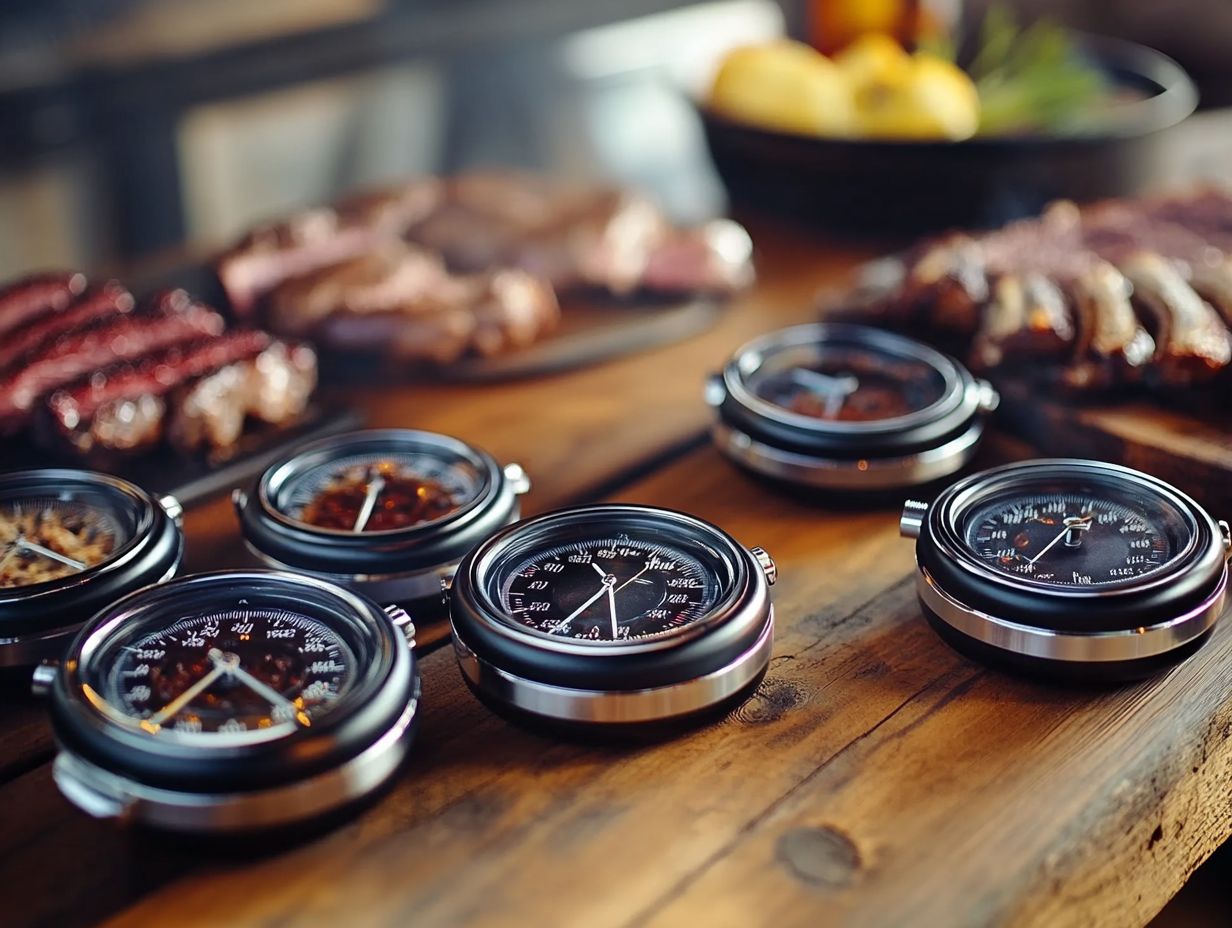
Regular calibration and maintenance of your smoker thermometer are crucial for ensuring its accuracy and reliability. This commitment keeps your cooking results consistent and allows the rich flavors of your grilled meats and vegetables to shine.
To achieve precision, perform specific calibration methods, like boiling point and ice bath tests. Regularly clean the probe to ensure accurate readings, as cooking residues can compromise its performance. By following the manufacturer’s guidelines, you can maintain the longevity and effectiveness of your device.
Finally, storing your thermometer in a protective case when not in use helps prevent damage and extends its lifespan.
Frequently Asked Questions
What are smoker thermometers and why do I need one?
Smoker thermometers are devices used to measure the temperature inside a smoker. They are essential for achieving perfect smoking results, allowing you to monitor and maintain the ideal cooking temperature.
Try using a smoker thermometer for your next BBQ meal and elevate your cooking experience!
What types of smoker thermometers are available?
There are several types of smoker thermometers: analog, digital, instant-read, and wireless. Each type has its own benefits, so choose based on your cooking style and preferences.
How do I calibrate my smoker thermometer?
To keep your smoker thermometer accurate, calibrate it regularly. Use the ice water method: fill a glass with ice and water, insert the thermometer probe, and wait for it to read 32 F (0 C). If it doesn’t read correctly, adjust it as needed.
What is the ideal temperature range for smoking different types of meat?
The ideal temperature for smoking meat varies by type. For instance, beef brisket smokes best at 225-250 F, while pork ribs should be at 225 F.
Research the best smoking temperatures for each meat to get delicious results!
Can I use a regular meat thermometer for smoking?
A regular meat thermometer can work, but it s not the best choice. Smoking takes longer, and you need to check the temperature regularly for best results. A smoker thermometer gives you accurate and consistent readings.
How do I clean and maintain my smoker thermometer?
To make your smoker thermometer last, clean and maintain it well. Use warm soapy water and a soft cloth to clean the probe, but avoid submerging any electronic parts.
Store your thermometer in a cool, dry place when not in use.

